
Search Results for chile

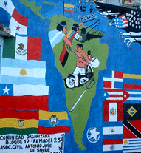
Latin America’s Leftist Shift: Hopes and Challenges
Within the last six years in
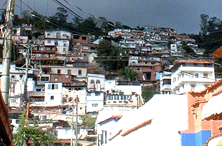
The World Social Forum and the Streets in Caracas, Venezuela
Caracas, Venezuela is a city made up of skyscrapers, colonial architecture and, wherever possible, the do-it-yourself tile and cement houses of poor neighborhoods, known as barrios. Though the local mainstream media ignored the coming of the 2006 World Social Forum, Caracans themselves found out quickly as they watched a parade of activists from across the globe pour into their city waving banners, setting up tents and discussing the state of the world on park benches and hotel lobbies.
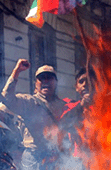
Bolivia’s Trial By Fire
After winning a landslide election victory on December 18th, Bolivian president-elect Evo Morales announced plans to nationalize the country's gas reserves, rewrite the constitution in a popular assembly, redistribute land to poor farmers and change the rules of the U.S.-led war on drugs in Bolivia. If he follows through on such promises, he'll face enormous pressure from the Bush administration, corporations and international lenders. If he chooses a more moderate path, Bolivia's social movements are likely to organize the type of protests and strikes that have ousted two presidents in two years. In the gas-rich Santa Cruz region, business elites are working toward seceding from the country to privatize the gas reserves. Meanwhile, U.S. troops stationed in neighboring Paraguay may be poised to intervene if the Andean country sways too far from Washington's interests. For Bolivian social movements and the government, 2006 will be a trial by fire.
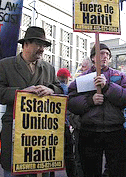
Before the Coup: Haiti’s Achievements Under Aristide and Lavalas
The long-suffering people of Haiti suffered a catastrophic blow in February, 2004 when U.S. Marines kidnapped and deposed democratically elected President Jean-Bertrand Aristide. The U.S., supported by Canada and France, forced him into exile, forbade him from even returning to the hemisphere, and reestablished a despotic interim puppet government backed and enforced by so-called UN peacekeepers and a brutal Haitian National Police.
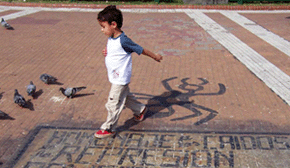
Five Lessons Bush Learned from Argentina’s Dirty War and Five Lessons for the Rest of Us
The Dirty War in Argentina is a complex story that can be viewed through a variety of lenses. During the six months I recently spent in Argentina, I found that the more I learned about the Dirty War, the more I was learning about the "War on Terror." To say that the current state of repression in the US is exactly like the Dirty War would be an insult to the 30,000 people who were disappeared and tortured in Argentina. The similarities between the two "wars," however, can indicate in what direction the US may be headed and how progressives can steer the country in another direction.
